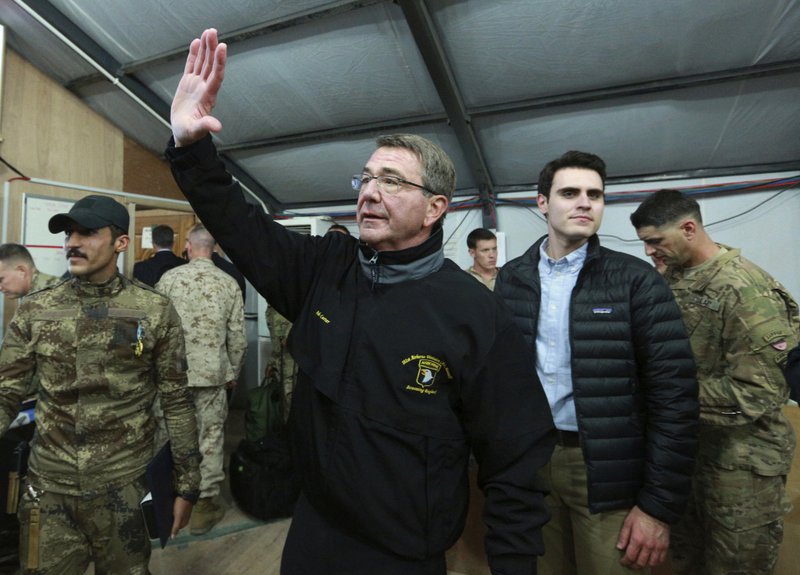LONDON -- U.S. Defense Secretary Ashton Carter and his British counterpart expressed confidence Thursday that the Trump administration will continue the United States' role as leader of the international military coalition against the Islamic State extremist group.
"I do have confidence in the future of the coalition campaign," whose central premise is that local forces must do the fighting, with support from the coalition, Carter said during a news conference. "It's logical. It makes sense," he said, adding that he believes that logic "will recommend itself" to the Trump administration.
Speaking after a meeting of 15 core members of the anti-Islamic State coalition, Carter said he intends to share his views on this with his successor, who is expected to be retired Marine Gen. James Mattis.
"Among my recommendations will be the need for the United States to remain actively engaged as leader of this coalition," Carter said. "Our coalition can and, I'm confident, will finish this job together."
The British defense minister, Michael Fallon, speaking alongside Carter, echoed his view.
"We're dealing here with a global threat," he said. "I have no doubt the next administration will step up to its traditional role" as a world leader, Fallon said.
The meeting took place against the backdrop of questions about what Donald Trump's arrival in the White House next month will mean for the coalition's future.
Closing out a nearly two-week overseas trip that included a stop in Iraq, Carter met with his counterparts and got an update from Army Gen. Joseph Votel on the battles to retake Mosul, the Islamic State's key stronghold in Iraq, and Raqqa, the self-declared Islamic State capital in Syria. As head of U.S. Central Command, Votel is the top officer overseeing the counter-Islamic State campaign in Syria and Iraq.
The defense officials also discussed doing more to train and equip the kinds of local Iraq and Syrian forces, including police and tribal fighters, that will be needed to hold Mosul and Raqqa once, as expected, the Islamic State is uprooted from those cities. The Islamic State has held those centers for more than two years.
Carter said at the meeting's outset that the coalition must remain involved in Iraq even after the Islamic State is driven from Mosul.
"We'll need to continue to counter not only foreign fighters trying to escape but also ISIL's attempts to relocate or reinvent itself," he said, using an acronym to refer to the extremist group. "To do so, both the United States and the coalition must remain engaged militarily. In Iraq in particular, we must be prepared to provide sustained assistance to the Iraqi security forces to consolidate security over the rest of the country."
The U.S. has about 5,000 troops in Iraq.
The comments came as a new report by United Kingdom-based Conflict Armament Research, a weapon-research group, cautions that the Islamic State's ability to produce its own weapons has become so sophisticated that its production lines almost mirror those of national militaries.
The report focuses primarily on weapon production in and around the Iraqi city of Mosul. A team of researchers from the group visited the eastern reaches of the city early last month as Iraqi forces attempted to push toward its center.
The research group visited six weapon-production facilities on the outskirts of Mosul for its report, documenting a range of munitions, production methods and raw material used to power the Islamic State's war machine. In total, the research group has spent roughly 30 months assessing the Islamic State's weapons and munitions along various fronts in Iraq and Syria.
"While previous CAR reports used the term 'improvised weapon production,' the phrase does not reflect the scale and sophistication of manufacturing encountered by CAR in Mosul," the report said. "The degree of organization, quality control, and inventory management, indicates a complex, centrally controlled industrial production system."
The backdrop to Thursday's conference in London was deep uncertainty in other coalition capitals about the implications, for the counter-Islamic State efforts, of a change in U.S. administrations in January. Trump has criticized President Barack Obama's approach to fighting the militant group as weak and ineffective, and he has suggested that the U.S. has blindly supported anti-Islamic State groups without knowing their true aims.
Other countries represented at the conference were Iraq, Australia, New Zealand, Belgium, the Netherlands, Canada, Denmark, France, Germany, Italy, Norway, Spain and Turkey.
The Russian military, meanwhile, scoffed at a top U.S. general's suggestion that military equipment seized by the Islamic State in the Syrian city of Palmyra could pose a threat to the U.S.-led coalition.
Russian Defense Ministry spokesman Maj. Gen. Igor Konashenkov said Thursday that an "insignificant number" of firearms and a few broken pieces of military hardware left in Palmyra "pose no threat to the international coalition."
U.S. Lt. Gen. Stephen Townsend had said Islamic State militants got hold of weapons, possibly including air defense equipment, when they retook Palmyra from Syrian government troops earlier this week.
Konashenkov, meanwhile, pointed at the U.S. Congress' decision allowing the delivery of portable air defense missiles to the Syrian rebels, saying they could pose a real threat to the U.S.-led coalition.
Information for this article was contributed by Robert Burns and staff members of The Associated Press and by Thomas Gibbons-Neff of The Washington Post.
A Section on 12/16/2016

